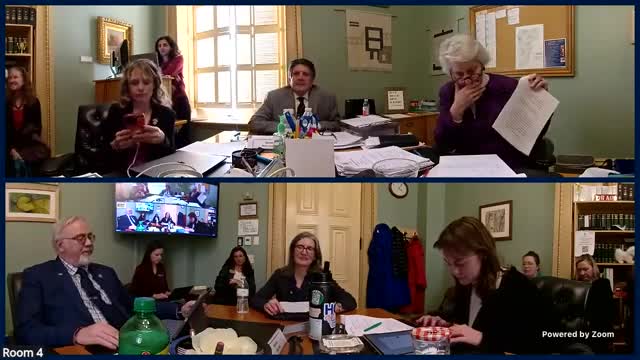Vermont senators hear requests to narrow hybrid-meeting rules, add site‑visit and cybersecurity exemptions
Get AI-powered insights, summaries, and transcripts
Subscribe
Summary
The Senate Committee on Member Operations on Wednesday, Feb. 26, heard testimony asking clarifying changes to pending open‑meeting law amendments that would affect how municipal and quasi‑public bodies hold hybrid meetings, post recordings and use executive session exemptions.
The Senate Committee on Member Operations on Wednesday, Feb. 26, heard testimony asking clarifying changes to pending open‑meeting law amendments that would affect how municipal and quasi‑public bodies hold hybrid meetings, post recordings and use executive session exemptions.
Witnesses said parts of the bill create operational burdens or legal uncertainty for bodies that routinely discuss private financial data, meet rarely, or rely on volunteer working groups. They urged the committee to refine definitions and add targeted exemptions rather than leave implementation to uneven local practice.
Cassie Colinas, representing the Vermont Economic Development Authority, told the committee that VEDA’s loan‑review process is “primarily an executive session” and that the authority’s 15‑member board—five ex‑officio and 10 gubernatorial appointees—routinely handles confidential business and personal financial information in closed sessions. “Right now, under the current law, we have hybrid meetings where we call the meeting to order in public. We approve the agenda, immediately go into executive session, do all the discussions about the loan applications, come out of executive session, take the votes, and adjourn,” Colinas said, arguing the hybrid requirement adds operational burden without public benefit for agendas that are entirely executive session.
Senators and staff asked whether the bill’s existing language covering “information related to interest rates for publicly financed loans” would already exempt the authority’s loan deliberations from the hybrid requirement. Committee counsel said that provision could apply; Colinas pressed for clearer language or a redefinition of “advisory board” so that entities with self‑funded budgets are not treated the same as town budgets based on taxation.
Samantha Sheehan, municipal policy and advocacy specialist for the Vermont League of Cities and Towns (VLCT), urged several clarifications she said come from repeated legal questions municipal attorneys receive. VLCT’s proposals included: - Require recorded audio/video be posted on a public body’s own website when one exists rather than on third‑party platforms that municipalities cannot compel to comply with public‑records timelines. - Require recordings be posted “no later than five calendar days” after the meeting and remain accessible for 30 days, to match expectations for meeting minutes and reduce public‑records requests. - Clarify that traditional town meetings are not meetings “of the body” (and thus should be treated differently in the statute) because attendees who vote act as legislators of the town rather than as representatives of municipal bodies. - Create an exemption or safe harbor for time‑limited delegated working groups and site visits so volunteer officials in small towns can do preparatory deliberative work without triggering open‑meeting exposure. - Add a narrowly defined executive‑session trigger for cybersecurity discussions and allow municipalities to remove obscene or illicit content captured by remote‑meeting disruptions before posting, provided the unedited original recording is retained for public‑records access.
Sheehan said these changes grew out of VLCT’s Municipal Assistance Center work and frequent legal inquiries from towns. “We are asking you to require the recordings be posted to a website that the public body maintains if one exists,” she said, adding that some municipalities post to third‑party channels where timing and availability are outside the municipality’s control.
Committee members repeatedly sought drafting specificity. One senator suggested asking the committee’s legal counsel to confirm whether the bill’s existing exemption for “interest rates for publicly financed loans” already covers VEDA’s concerns. Committee staff said they would have counsel review the suggested language and that VLCT could draft precise statutory text for working‑group and site‑visit exemptions.
There were no formal votes recorded on the bill during this hearing. Committee members said they expect further work on language before moving the measure and encouraged witnesses to provide proposed statutory text during the committee’s next week of work.
The hearing also included detailed discussion of process mechanics—how frequently bodies approve minutes, how rare‑meeting entities comply with posting deadlines, and the risk volunteers face when doing deliberative groundwork without staff support. Witnesses and several senators expressed interest in balancing transparency with practical limits on small municipalities’ capacity to comply with remote‑meeting technical requirements.
Committee staff and witnesses agreed to follow up: legal counsel will review the interest‑rate exemption’s scope and VLCT offered to deliver model language on working groups and posting requirements for consideration at the next committee meeting.
